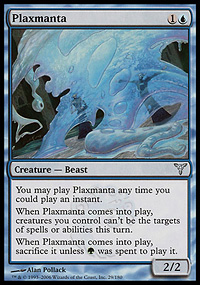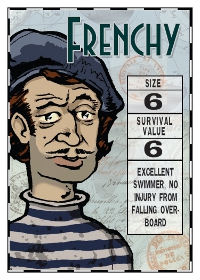About translations

This is the “Crybaby Manta” according to the publisher.
We are constantly translating board games here, and I participate quite vividly in this. Because, for example, I hate to explain the “night table” with gestures or draw “base camp”.
Recently, a small package of rakes has accumulated, which may be useful to you.
Names in the examples
Almost everyone understands that Alice, Bob, and other alphabetical comrades should participate in the examples. At the same time, in the mnemonic system there are still characters Eve and Mallory who do not fit in the sequence, because they are Eavesdropper and Malicious attacker, that is, passive and active attackers. In our mnemonic system of the attacker, Zinovy plays, which often gives particular chic to the translations of examples.
Guess the word
The most frenzy is an attempt to translate games into guessing words. Literal translation turns such a game into a branch of hell. Full-fledged work requires 4-5 passes throughout the database of names, that is, simply incredible patience. I twice played word games before they entered the Russian market, and now I know what serious mistakes even the largest players make.
The first classic rake is a translation into the exact term. Here you need to catch all the situations when two Russians are obtained from one English word. For example, the same basecamp or something similar. Sometimes they can be turned into one word that is understandable to a Russian person: from a “vehicle for transporting infantry” you can still make “BMP”, but most often it is better to replace it with a close one in meaning.
The second problem is the choice of the word to be guessed from the extremely rarely used part of the lexicon. For example, it is very difficult to distinguish tights from trousers when shown with gestures - and it would be better to translate it exactly as “trousers”. Here, the check is also quite simple - you can pack all the words into Yandex.Wordstat in a bundle and check the frequency of their mention. If it is below a certain threshold, you need to search and select the one that prompts Wordstat as a relevant request.
The third problem is ambiguity. Chopper is a knife, a helicopter, and a bike. It is not a fact that the translator saw the picture when he translated the word, so be sure to look at the finished publication for such surprises.
Currency and units
Obviously, you need to translate them into SI units that the player understands. Almost all translators understand this, but on the quiz “Bet you”, we had a problem with humanitarian education. The fact is that many people confuse mass and weight, as well as numbers and numbers. Therefore, on the last pass, for example, I had to clean questions like “What is the weight of the thickest cat in the world?” And replace it with “What is the weight of the thickest cat in the world?”.
Another problem is the translation of invented currencies such as space loans: the word “credit” itself has too many meanings in the Russian language, so we try to replace them with something like space rubles.
Capital letters
Suppose you have five characters in your game — for example, a captain, a major, a lieutenant, and two ensigns. So, for some reason, translators regularly forget that in the Russian language many words, as they were written with a small letter, continue to be written. If you see Captain, Damage Markers or Experience Points in the rules of the game, be aware that the translator is the first to blame, and then the corrector.
At the same time, by the way, the Rabitsa net, the Gatling gun and the Maxim machine gun owe the names to Karl Rabitz, Richard Gatling and Hyrum Maxim (and Maxim is a German surname in general).
Proper names, names and terms
A rather difficult part of the translation is to think through a through dictionary of game terms. The procedure is this: first, a couple of books from the subject area of the game are read. For example, about submariners, firefighters or nuclear developments, if the game is about it. Then, all the gleaned terms are compared with the game ones. This is how we fixed “yellow cookies” - uranium ore, which in professional literature is called just yellow cake, without translating the second part. Or, for example, there was a "specialist in the removal of gases during a fire" - in our country this person is called a gas smoke protector. All sorts of “car operators” are growing from the same places instead of drivers.
On the other hand, quite often names and abbreviations contain important plot information. Let me give you an example from real IT practice - somehow, it was far from accidental that we passed the “Vehicle Management and Control System” for a long time, knowing that drivers would call it by the first letters simply intuitively.
It is often difficult to translate game terms. The funniest example I've seen is the “Hot chair”, that is, the “Hot seat” (according to the rules, this is the one who is now answering the quiz question). It is important here that the translation be related to the gameplay - for example, due to the inability to adequately transfer the term, we simply introduced the notion of an “active player” familiar to other games. The meaning is not lost, the translation is smooth.
The names of the authors, we also began to translate from some point. We indicate in the original language at the end of the rules, and in Russian letters on the box. Otherwise, this is not a name, but a rebus. The key point is to ring the voice to the author himself and find out exactly how the name is pronounced.
Character
Names Game Character Names is a song. The fact is that authors very often come off on them, conveying character. I like to remember the translation of the game “Overboard!”, Where there is a gopovoy sailor named Frenchy. There is a whole gamut: and marine origin, and the criminal past, and a little criminal attitude. In general, this is how Scoop appeared.

This hero
But Dr. Harter did not give up - there were options with Kostoprava, and Dr. Lector, and the like, but did not go. On the other hand, I imagine how difficult it will be to translate our Vasya Kursky and Sasha Central into English.
Oh, by the way, about the characters. Did you know that Schrödinger had a cat, not a cat, but its gender was lost in translations?
Trivia Questions
A separate topic is the translation of quizzes. The first localization approach, of course, is understandable: for example, if the question is “How many turkeys are slaughtered in the country for Christmas”, then it is better to replace it with something more understandable such as “How many cakes are eaten in the country for Easter.” Often there are questions about local rock stars, actors, and so on - also direct replacements for our comrades. Sometimes the questions are related to local customs or norms: it is better to replace them altogether. For example, it’s quite difficult to figure out how much hot Tobasco sauce a resident of Cuba eats, but it’s pretty easy - how much vodka our compatriot drinks in a year.
The second aspect is more interesting, and most often concerns American quizzes. The fact is that it is necessary to localize not only the game itself, but also patriotism. For example, the questions “Who was the first man on the moon”, “When was the Gettysburg battle”, or “How many aircraft carriers in our fleet” are, but you will never find the questions “Who was the first to fly into space” or “When did we retreat from Of Vietnam. " But about other countries, the questions will be just different: “How much is an average Russian imprisoned,” “What is the percentage of Mexicans who are criminals,” and so on. It is important to have a sense of proportion - and leave reasonable questions about America, from time to time replacing the cheers-patriotic. You don’t have to do this, but I just really don’t like it when we are also trying to export culture. Therefore, in the localization of "Bet" there were questions about Gagarin and Tolstoy,
Names of components
As a rule, each object has its own name. For example, in Alcatraz there are “locations” —cards of individual prison blocks — the direct translation of “place” does not reflect the essence very well, but I don’t want to leave a roughly borrowed word. Therefore, the translation is “premises”. A similar story with token, tile, and meeple. You need to look at the situation. The first is most likely a marker or token, the second is a chip or something similar, and the third is a figurine.
“Tiles”, for example, can almost always be tied to game reality, so that additional terms for the player do not appear - for example, if we are talking about the tiles of the ship’s modules, then they should be called modules, and if about the submarine compartments, then, respectively, the compartments . The difference is: “Put 4 gangsters on each city map” and “Put 4 gangsters in each city”. The first is more definite, but with a high complexity of the game, it gradually starts to resemble matanalysis, and the second is easier to read and understand, but if used incorrectly, it can introduce uncertainty. It is necessary to solve according to the situation.
Kind
For example, there is a base for 2000 words, you need to translate into Russian. We look at the rules, it turns out that players need to add an adjective to each word to explain, and the words are secret. In Russian, adjectives (as opposed to the original language) convey the gender, for example, “red” and “red”, which is already a direct clue for players. The way out is to either change the rules, or, as we did, take the entire database of words and translate it as strictly as possible into the masculine gender, and, accordingly, make a bunch of replacements.
Expert Check
Even after the transfer of specialized games, we almost always give proofreading rules to the representative of this profession. For example, before the Flashpoint translation, we already knew that little could offend a specialist like “Firefighters rolled hoses” - not “firefighters”, but “firefighters”, and in general, judging by the context, they extended hose lines.
When Steam Torpedo came out, we sent the rules to a real submariner. As it turned out, we hardly messed up - he just replaced the “wheelhouse” with a “central post”. But at the same time, our expert, alas, did not understand that the game was about the invented world of steampunk, and gave a detailed technical justification why the Gatling gun with one of the cards would not shoot under water. Never.
PS And now tell me, if not difficult, what kind of rake you have with translations.
PPSBeerlander from the comments posted his topic about software translations.
